Oral Appliance Therapy – Denver, CO
Each Appliance Custom-Made Just for You
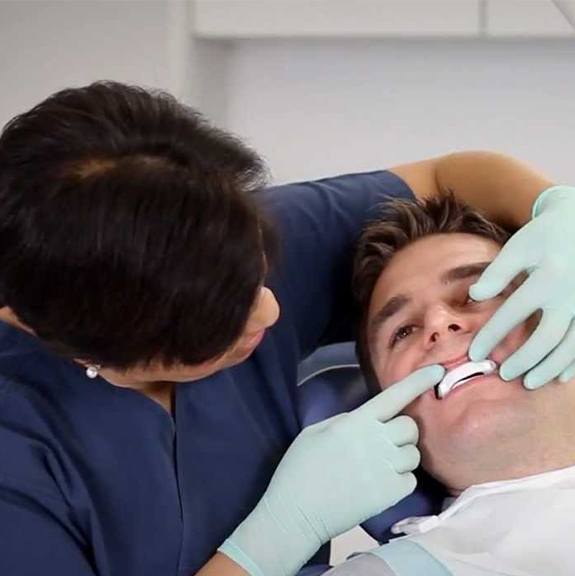
Even though CPAP machines are proven to be highly effective at treating sleep apnea, nearly half of all patients will stop using them altogether after one year. This is because the machine is often so noisy and uncomfortable that they still find it hard to sleep – which obviously defeats the purpose of the treatment! The good news is that patients with mild or moderate obstructive sleep apnea have another option to consider.
Contact Downtown Denver Sleep Solutions to schedule a consultation with Dr. Thompson. He can provide custom-made oral appliance therapy for Denver, CO patients that will adjust your jaw and tongue to keep your airway open as much as possible, which can improve the quality of your sleep every night.
Why Choose Downtown Denver Sleep Solutions for Oral Appliance Therapy?
-
Each Oral
Appliance Carefully
Customized - Comfortable Boutique-Style Office Amenities
- Each Patient Receives Individualized Attention
How Does Oral Appliance Therapy Work?

After receiving your diagnosis, we’ll take an impression of your mouth so that a sleep appliance can be made. You’ll only wear it at night when you go to bed. It is worn just like a mouthguard used for sports, except instead of protecting the teeth from external damage, its purpose is to move the lower jaw forward so that the throat and facial tissues won’t collapse and block the flow of air, allowing you to sleep peacefully and breathe easily at night so that your mind and body are fully alert and awake during the day.
What Are the Advantages of Oral Appliance Therapy?
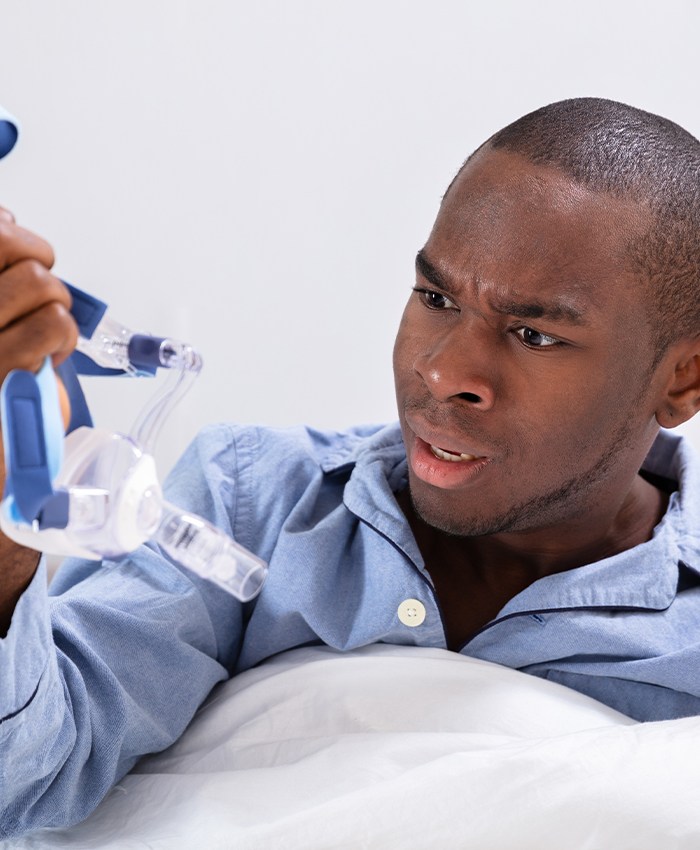
- Compared to a CPAP machine, an oral appliance is much easier to use since you don’t have to worry about a machine or cleaning various tubes; just put the appliance in your mouth before bed, and you’re all set!
- Each oral appliance is carefully designed to fit perfectly on your teeth, making it much more comfortable than the bulky mask that you have to wear for CPAP therapy.
- Since there’s no machine involved, your oral appliance won’t make any noise that could keep you up at night (or disturb your bed partner or a nearby roommate).
- CPAP machines can be inconvenient to take with you while you’re traveling, and in many cases patients end up just leaving them at home – which is an issue if you happen to travel frequently and thus aren’t benefiting from the therapy much of the time. Oral appliances are very small and can easily fit in your luggage, making them much more convenient to travel with most of the time.
Who Could Benefit from an Oral Appliance?
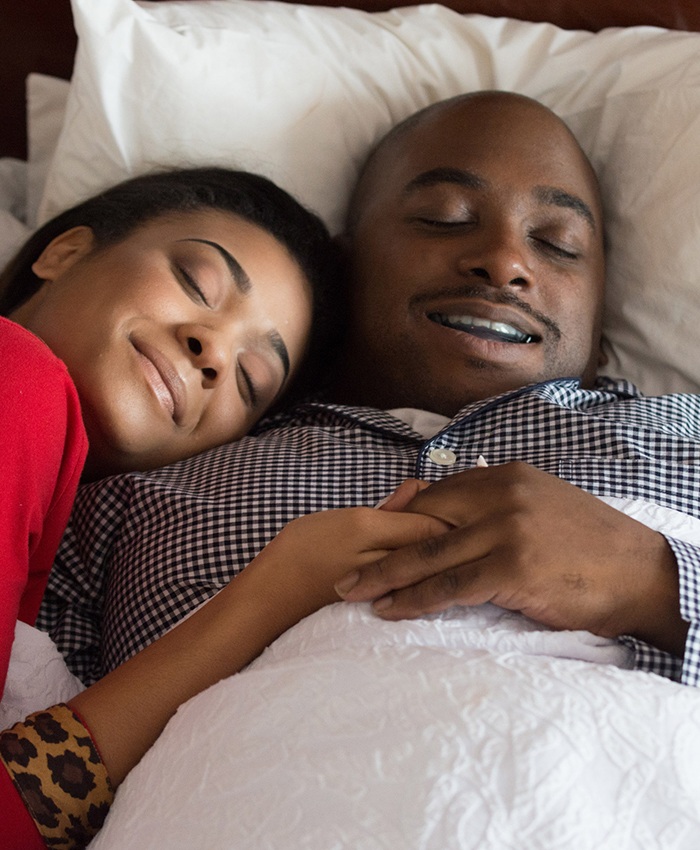
You may be a candidate if you have a mild or moderate case of obstructive sleep apnea; more severe cases usually require a CPAP or surgery. Many patients who don’t like CPAP or don’t get the results they want from the therapy switch to an oral appliance. You may also try this form of therapy if you’ve had corrective surgery performed but haven’t seen an improvement in your symptoms (such as frequent snoring). An oral appliance can be used to protect your teeth and treat your sleep apnea at the same time if you’re also suffering from bruxism (teeth grinding). Also, oral appliances and CPAP can sometimes be used at the same time depending on your needs.
How Can You Get an Oral Appliance?
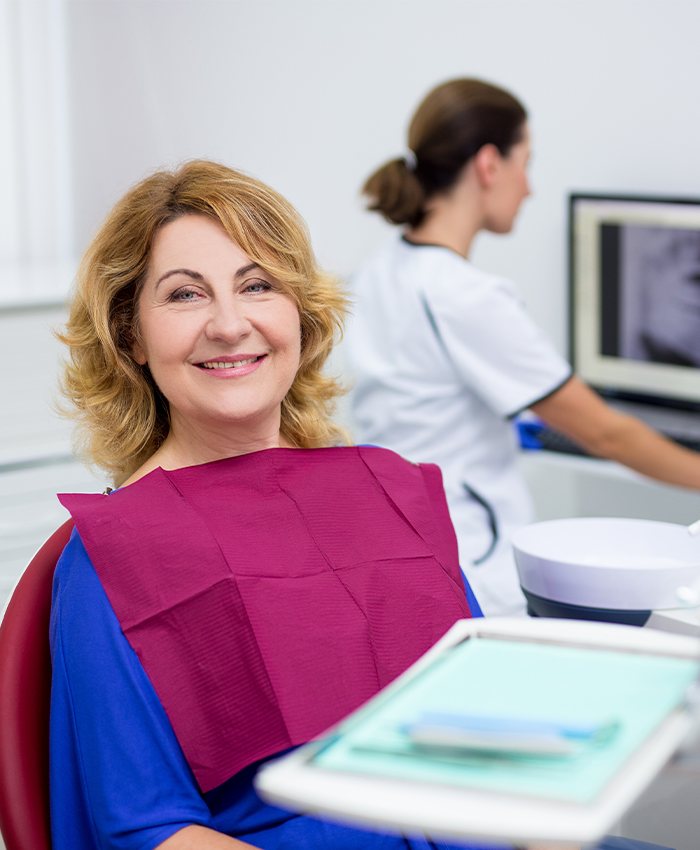
The process for getting an oral appliance depends on what you need it for. If you’re mainly concerned with stopping snoring, all you need to do is schedule a consultation with Dr. Thompson so that he can check your airway to see if an oral appliance might help. If he finds that it’s a viable option, he’ll take an impression of your teeth so that he can design an appliance, which should be ready in about a week under most circumstances.
However, if you think you might have sleep apnea, you will need to take some additional steps before receiving your appliance. We can only prescribe therapy for a sleep disorder that has been properly diagnosed, so you’ll need to have a sleep test performed. With our at-home sleep testing, this can be done in your own home so that there’s no need to go to a separate laboratory. A nearby sleep physician will perform the necessary evaluation to determine whether or not you have sleep apnea. We will go ahead and start the process of designing your appliance once a diagnosis is received.
Are the Oral Appliances Really Custom-Made for Every Patient?
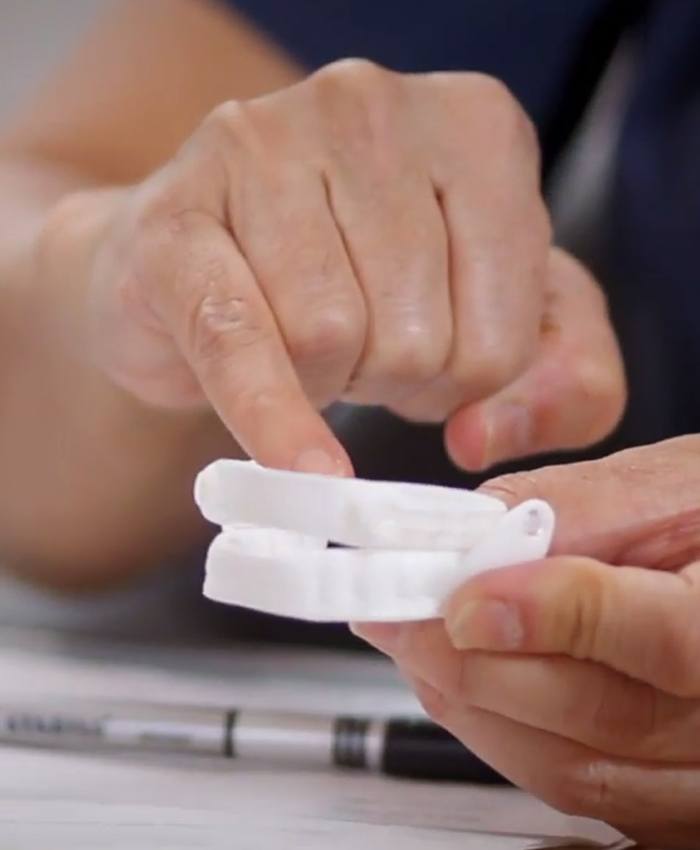
In fact, they have to be! Everyone’s mouth is different, so each oral appliance has to be carefully designed to fit correctly for the best results. Dr. Thompson takes a lot of pride in working with the top manufacturers in the world in order to provide appliances that have been customized down to the smallest detail – you’ll never have to worry about being stuck with a “one-size-fits-all” solution.
Learn More About Our Oral Appliances
What Should CPAP Users Do?
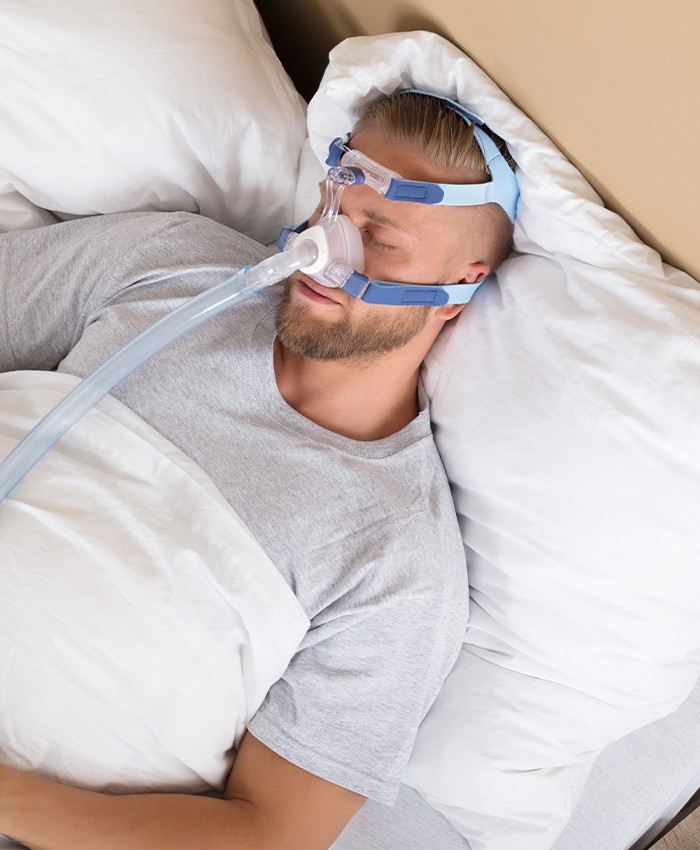
It’s entirely possible to switch from CPAP therapy to oral appliance therapy if you feel like it would be more beneficial. However, you need to consult with your sleep doctor first to determine whether or not it’s an option in your case; an oral appliance might not be enough on its own in certain severe cases of sleep apnea. We’re more than willing to work with other physicians in order to get you the quality care that you deserve.
Is Oral Appliance Therapy Covered by Insurance?
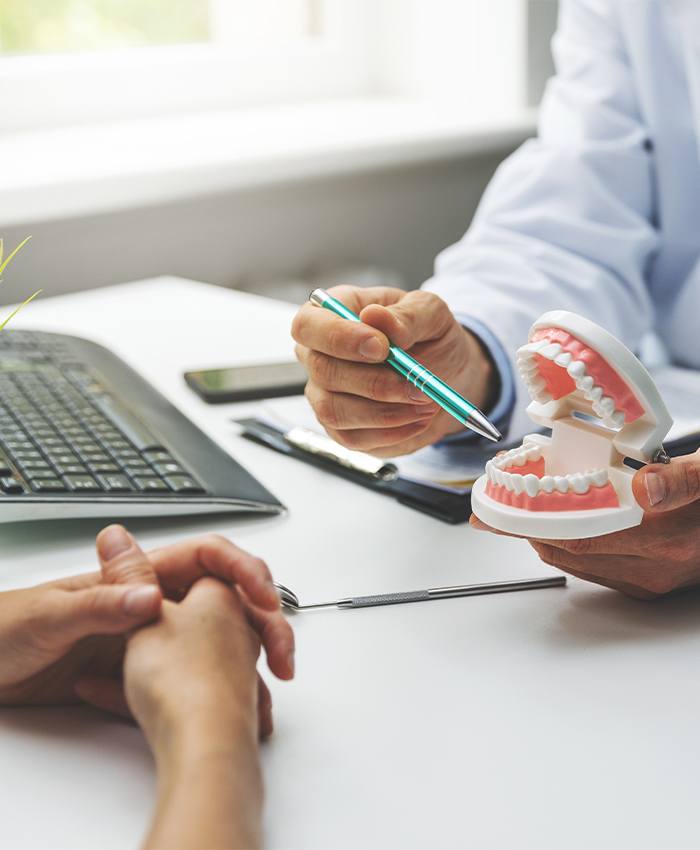
That depends on what kind of insurance you’re talking about. Even though sleep appliances can be provided by a dentist, they usually aren’t covered by dental insurance. However, regular medical insurance can be used to help pay for them instead since sleep apnea is considered a medical condition. If you find yourself confused by the process, don’t worry; you’ll have our insurance coordinator Andrea as well as the rest of our team to answer your questions and help walk you through everything step by step. We’ll help you reduce your out-of-pocket expenses in order to make your treatment as affordable as possible.
Oral Appliance Therapy FAQs

If you struggle with sleep apnea, oral appliance therapy may be able to help you get the full night of restful sleep that you deserve. However, you may still have some unanswered questions, so we’re here to help! Here are the answers to some of the most common queries we receive about oral appliance therapy in Denver. If you don’t see the information that you’re looking for below, give us a call. We’d be happy to explain more about the treatment and get you started with a consultation.
When Will I Notice Results from Oral Appliance Therapy?
When you first begin using your oral appliance, you may notice that your snoring is reduced or eliminated within just a few days. However, most patients notice optimum results in approximately two weeks. During this adjustment period, your airway may recover from some of the irritation it experienced due to sleep apnea, and you will get more used to using your appliance. Over time, you should notice that you are more alert during the day and have an easier time performing daily tasks as your concentration improves.
How Long Will I Have to Use Oral Appliance Therapy?
Oral appliance therapy is a long-term treatment for people with obstructive sleep apnea. Ultimately, you can expect to use it for many years. However, you might be able to discontinue use if the factors behind your sleep apnea are addressed. For instance, if you lose a significant amount of weight or undergo surgery to address an issue with your airway, you may not need to use your appliance anymore. Just remember that it is always a good idea to consult with us before you stop your oral appliance therapy.
How Can I Care for My Oral Sleep Appliance?
It’s crucial that you keep your appliance clean. You should brush it daily with a soft toothbrush, but don’t use regular toothpaste on it. Instead, use mild soap and warm water. Remember to keep it stored safely in a case so that it won’t wind up lost or discovered by a pet. Don’t leave it in places that get particularly hot either, as the appliance can warp when exposed to high temperatures.
How Can I Adjust to Using My Oral Appliance?
It’s normal for your appliance to feel strange at first. You may notice extra saliva, or you may unconsciously remove your appliance during sleep. In most cases, the best way to address these issues is through time and patience. The more you wear your appliance, the quicker you can expect it to become a normal part of your routine.
How successful are oral appliances at treating sleep apnea?
Oral appliances are most effective treating patients who have mild to moderate OSA, but in some cases may help those who have severe OSA. Because using an oral appliance is considered non-invasive, they may be prescribed before resorting to more invasive procedures such as surgery.
What are the benefits of oral appliance therapy?
Oral appliance therapy has many benefits, including the improvement of OSA symptoms. Oral appliances can make it easier for patients to sleep, which can in turn lead to less daytime sleepiness, cognitive issues, and mood changes. They can also reduce or eliminate or reduce snoring at night, making it easier for your partner to sleep, too. Furthermore, because they are small and compact, oral appliances are easier to store and use while traveling, and they won’t disturb your sleep partner like CPAP machinery can.
What are the risks of oral appliances for treating OSA?
Although oral appliances have been proven safe, there are still some risks to using them when treating OSA. Some patients have noticed changes to their bite following use of an oral appliance. Another common side effect is dry mouth or excessive drool. There is also a small risk of loose teeth, or of needing dental work replacement.
Who shouldn’t use an oral appliance for sleep apnea?
Although they are convenient and extremely effective, there are still some patients who shouldn’t use oral appliance therapy to treat their OSA, including:
- Patients with central sleep apnea should not use oral appliance therapy, as this condition is caused by signaling problems in the brain, which oral appliances cannot treat.
- Children with breathing difficulties need different treatments than adult patients. Please only use oral appliance therapy for a child if their doctor has recommended it.
- People with severe OSA should follow their healthcare providers guidance when using an oral appliance. In some cases, they may benefit from both appliances and CPAP if one method is not enough.